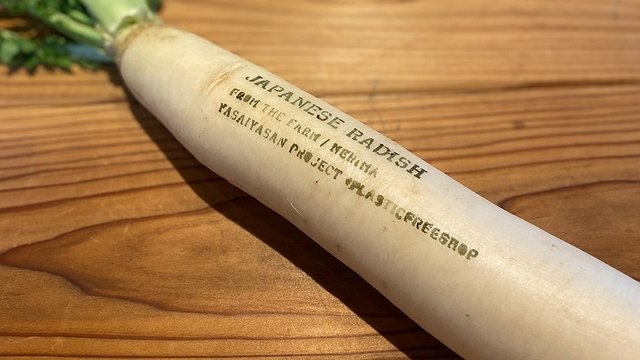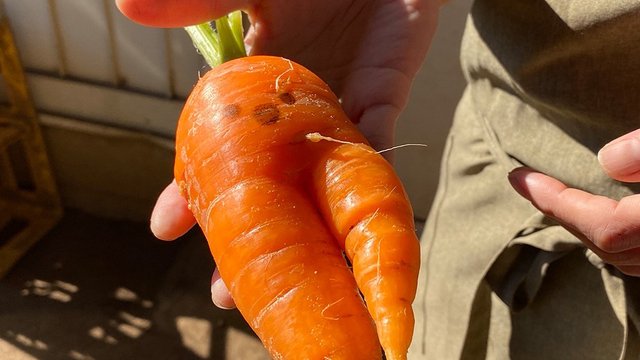Edible ink labeling shall free Japanese vegetables from plastic packaging
An experiment with edible ink may be the simple, yet revolutionary, idea needed to free Japan’s vegetables from unnecessary plastic wrapping.
In Tokyo’s Nerima Ward, creative solutions company know Inc. is working with a local farm to sell plastic-free vegetables. It does so by printing product information directly onto the vegetables using edible ink, thereby eliminating the need for wrapping.
Know uses an edible ink pen from Italy to stencil words directly onto vegetables sold by Shiraishi Farm at its farm door and local markets. The ink contains water, glycerin, ethanol, citric acid and food dye.

(Image: know-corp.jp)
The ink is used mainly on second-grade vegetables deemed unsuitable for the wholesale market. They include carrots and long, white Japanese daikon radishes that have grown ‘legs’ instead of one straight root. These get eyes and noses drawn on them, and a consequent warm reception from kids. The absence of any wrapping also encourages customers to pick the products up.
Questioning our daily habits
We are beginning to understand how insidious and pervasive plastic is in our lives, especially in the oceans and the food chain. Companies worldwide are busy working out how to make their product packaging recyclable. That comes in line with one of the United Nations’ sustainable development goals (SDGs) – to substantially reduce waste through prevention, reduction, recycling and reuse by 2030.
Simultaneously, there is an understanding on the individual level for the need to take action locally, and a desire to do so. The simple, yet effective, idea of using edible ink gives us hope that we can each make such a difference.
Know hopes its approach will help boost people’s awareness toward the environment by encouraging them to question the everyday practices that they have accepted as normal. This includes wrapping vegetables in plastic to protect them and group them.
Nerima Ward has the most direct sales stalls of vegetables in any region of Tokyo. Therefore know aims to expand sales points to include more of these local farmers. The stores will be branded with the same hand-painted wooden signboard that reads, “plastic-free shop” and “Greengrocer.”
Looking ahead
Customers who travel to a farm door to buy produce are probably more likely to embrace the idea of wrapping-free vegetables than those who shop at supermarkets and don’t want their purchases damaged as they lug them home. However, it is hopeful that this idea may eventually be broadly applied is the many potential positives for supermarket companies.

(Image: know-corp.jp)
The novelty aspect of drawing eyes and noses – or messages (‘an apple a day’), or simple recipes – directly onto vegetables gives the edible ink idea clear value as a marketing strategy.
Ultimately, the most value information that could be stenciled on to vegetables is probably a QR code. It could give recipe ideas, recommendations for complementary purchases, and even price information that could be altered as the vegetables age. There is even potential to help prevent food loss by enabling the lives of fruit and vegetables to be tracked until the day they are washed and eaten.
[Website] know Corp Homepage
(This article was originally published on Zenbird Media.)
Additional Resources
Zenbird Media Homepage
More on responsible consumption
More on plastic free solutions